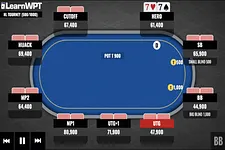Hand Review: Solaas Bluffs Lewis at Aussie Millions Final Table

Covering live poker tournaments for a living affords me the opportunity to see countless thousands of hands played out, many of which offer interesting and potentially valuable insights into how players — both amateurs and professionals — play the game. In this ongoing series, I'll highlight hands I've seen at the tournaments I've covered and see if we can glean anything useful from them.
The Scene
Back Down Under for another fun hand from the 2018 Aussie Millions Main Event final table, this time showcasing a battle of two deep-stacked European pros going to war, one of whom was mixing it up with a less-than-premium holding.
Six players still remained at the final table over 50 hands in, with Espen Solaas (pictured above) and Toby Lewis playing the two biggest stacks. When the following hand took place, Solaas had about 6.3 million and Lewis about 7 million with blinds and antes at 40,000/80,000/10,000.
The Action
Solaas raised from the cutoff to 180,000 with 10♠6♠ and Lewis called out of the small blind with A♥Q♠.
The flop came A♦6♣4♣ and Lewis checked. Solaas bet 140,000 and Lewis made it 400,000. Solaas called and they took in the 5♠ on the turn. Lewis bet 450,000 and Solaas called once again.
The 3♣ river made four to a straight and Lewis checked. Solaas slid 800,000 in and Lewis didn't think long before sending his cards into the muck.
Concept and Analysis
This hand begins with Espen Solaas making a fairly aggressive open from the cutoff holding 10♠6♠, likely looking to target the big blind of Charlie Park, the least experienced player at the final table. However, instead he gets action from the only player at the table who covers him, Lewis.
Lewis decides to just call with A♥Q♠ even though he is a big favorite against Solaas' opening range. Lewis is likely not too worried about a squeeze, plus he probably doesn't want to bloat the pot too much out of position against the one player who could do serious damage to his stack.
On the flop, the standard play in this spot would be for Lewis to check-call. However, he opts for a small check-raise. This play used to be pretty common, but nowadays many players just call here with the reasoning that they don't want to chase away bluffs and they'll keep the pot smaller in the event they're beat.
I like doing this every now and then when you flat with good hands in the blinds, because it helps widen your check-raising range a bit beyond some draws, airballs, and nutted hands. It makes you a little more unpredictable so opponents can't expect you to take the cookie-cutter check-call line, where the in-position player can take free cards on the turn and realize their equity.
Lewis should still mostly have the best hand even when Solaas calls, and continuing aggression on the 5♠ turn seems pretty standard. However, betting only 450,000 lets Solaas continue with most of his range, as anything that has so much as a pair and/or a gutter is getting decent odds of about 4-to-1 on a call.
Solaas again peels and the river 3♣ completes everything. At this point, Lewis has little choice but to check. Betting would be turning his hand into a bluff, and what hands including a seven is he flatting in the small blind and then check-raising on the flop? He could rep a flush, but his hand has pretty decent showdown value.

Solaas, however, could definitely have a seven or better given his opening range in the cutoff. Knowing this, he opts to turn his pair into a bluff and fire a smallish bet of 800,000 into the pot of over 2 million. It's a good play because he's most likely going to lose a showdown, but Lewis has few nutted hands on this board.
Check-raising a flush draw on the flop would make some sense, but Lewis would almost certainly barrel the river. A line of check-raise, bet, check just isn't that common for a player on a draw who gets there. They're risking getting no value out of the hand.
As for Lewis, he can't do much but fold here. He has no blockers and there are too many hands that make sense for Solaas, including stuff like 7x5x- and 7x6x-suited.
This hand shows why many players like to employ a "three-bet or fold" strategy out of the small blind. It's a very difficult spot from which to play when stacks are deep against savvy, sophisticated opponents. Had Lewis three-bet preflop, Solaas would have folded. But even if he peeled for some reason, Lewis probably could have ended the hand with a turn bet and taken down a hefty pot.
Using position and a changing board texture, Solaas found an opportunity to steal a large pot from an opponent who was handcuffed by a board that favored Solaas' range.













